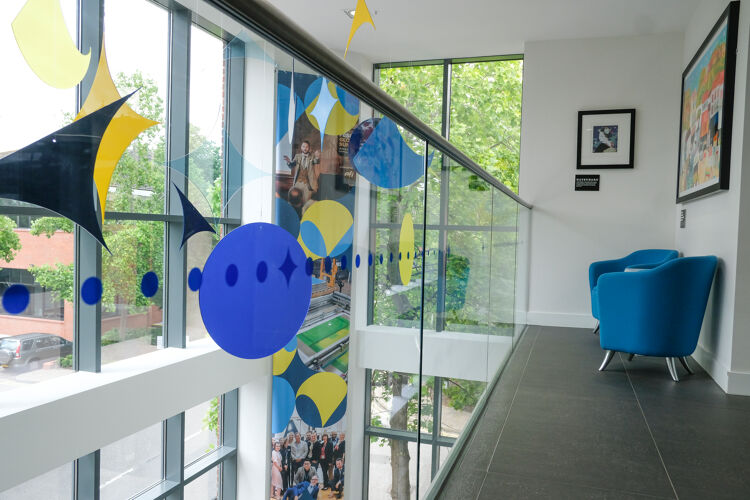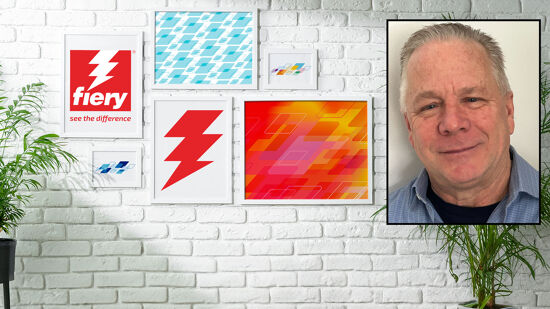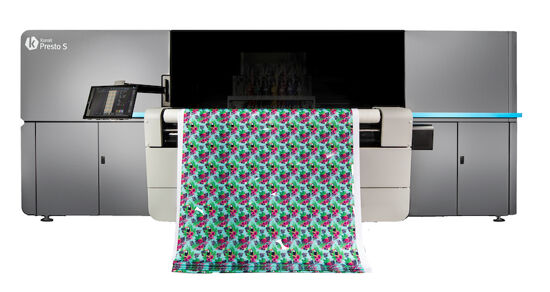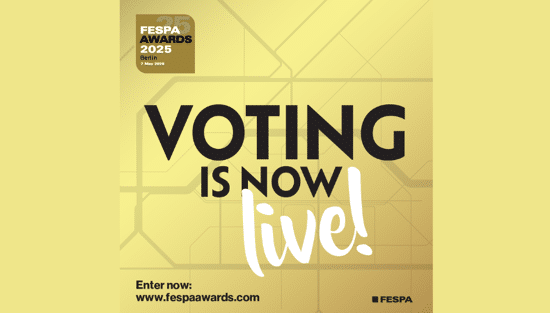Signs of the times

When FESPA’s Technical Support Manager, Graeme Richardson-Locke was tasked with redesigning the FESPA HQ atrium, he enlisted the support of two-time FESPA Award winner and FESPA UK member, HNS Signs.
We spoke to the fourth generation sign painter and HNS Signs founder, Michelle Henry about how her team came up with the stand-out creative ideas that would bring the new atrium to life.
Founded in 2010 by Michelle Henry, HNS signs is a Birmingham-based sign maker and signage manufacturer, comprising six employees. The company has extensive expertise across all types of signage, with offerings including sign painting, retail signs, illuminated signs, plaques, office wallpaper and wall art. This broad spectrum enables the HNS Signs team to provide a more unique approach to each individual customer and their associated projects.

At the FESPA Awards Gala Dinner in May 2018, Graeme approached HNS Signs after receiving their second FESPA Award in the non-printed signage category. Having seen their work before, it was clear to FESPA that HNS had the capabilities they were seeking for the atrium re-design. Right from the offset Michelle and her team were keen to be involved in the project.
A collaborative approach
Graeme briefed HNS on how FESPA wanted to transform the atrium space to be more welcoming and a source of inspiration to the FESPA team and all visitors to the office, as well as a showcase of the broad spectrum of print techniques across textile, décor and signage.

HNS Signs were granted a great deal of creative freedom, allowing Michelle and her team tocome up with a series of concepts that were fit for purpose. “No matter, what the project is, we like to involve the whole HNS team – it’s a joint creative effort. We always have a early planning meeting where we look at what the organisation does, what its values are and who it represents. We then collaborate closely with the client to define what the final design will look like.”
Upon pitching their recommendations on the atrium design, FESPA was extremely impressed with HNS Signs’ clear understanding of the brief and their suggestions hit the mark.
Once Graeme had approved the ideas for the atrium, HNS shared designs, prototypes and scaled down examples of each asset, ensuring that every part of the project was 100% in line with FESPA’s vision. Additional elements were then incorporated throughout the design stage, including the FESPA Awards artwork that was donated and the plaques that sat alongside them.
From initial concept…
As with any project, there are always challenges to overcome. “When designing the atrium, it was very important for us to reflect the values of the whole international organisation and showcase the work that FESPA and its associations do across the globe,” explains Michelle.
There were also environment constraints, particularly with the large glass windows that surrounded the atrium. HNS soon found out that no window graphics were able to be placed on them, voiding the initial idea to use them to create a stained glass effect. The solution? To create a dial, suspended in the entrance that would feature FESPA’s corporate colours and shapes.

“With the dial, we didn’t know how much the acrylic shapes were going to weigh, what was going to be in the ceiling when we drilled into it, or how much of a draft there was going to be coming in through the double doors,” explains Michelle. “To ensure that the acrylic was the right size, we had to play around with the design and we even hung a prototype to the shutters in our own building to see how it would perform before installing it at FESPA HQ.”
HNS was then able to use a simple strip of vinyl that featured FESPA’s corporate branding on the glass around the staircase. The light hits the shapes and creates a reflection on the floor, which adds further dimension to the design.
Unexpectedly, the large pillars in the atrium weren’t the same width from top to bottom which made printing and wrapping them a lot trickier, especially when ensuring that the print lined up. Luckily, HNS came up with the solution of using a vehicle wrap, which was more dynamic and could be more easily stretched.
“Not only was this a creative task for our team but it was also an engineering task to ensure that all of the components of the design work alongside one another,” says Michelle.
A key specification from Graeme was that, in and amongst the creations from HNS, FESPA wanted to showcase some of the industry talent by displaying artwork from previous award winners.
“The artwork followed a simple style with black and white borders. To continue this theme, we created black plaques with white text that provided information about the artwork. By laser engraving the text and including 3D letters, it meant that in the bright, spacey area, there was a natural drop shadow which makes it more eye-catching,” Michelle explains.
With a well-travelled team of employees, FESPA also wanted to demonstrate the breadth of countries that they visit, which was shown with a map printed onto a cork board surface where images can be pinned by team members.
…to finished project
“By combining print and non-printed signage techniques, we were able to achieve a bright and inspirational space in the atrium. Seeing it all come together and how pleased Graeme was with the final result had to be the most rewarding part for us,” says Michelle.
She continues, “Over the years of being a FESPA member and attending the events I have met with peers, seen new technology and learnt a lot about the industry. It is a great organisation to be involved with and it was a real pleasure to help create this space for the FESPA team”.
With all aspects of the atrium now installed, the vision that FESPA originally had set out has become a reality with the support from HNS Signs and a host of printed and non-printed signage techniques. To learn more about the atrium project and see how it came to life, watch the video here.
Topics
Interested in joining our community?
Enquire today about joining your local FESPA Association or FESPA Direct
Recent news
.png?width=550)
FESPA Middle East 2025 Overall Highlights
It has already been 2 weeks since we opened the doors on the 2nd edition of FESPA Middle East.

How will Fiery simplify print processes and enhance their user experience
In this podcast, Debbie McKeegan interviews Michael Chramtchenko, Chief of Staff, Sales and Marketing at Fiery, discussing the company's innovative software solutions for the print industry, particularly in garment decoration.

What is digital textile printing and what are the opportunities?
Nessan Cleary shares how textile printing covers a wide range of different market sectors which vary in opportunities. Nessan discusses sportswear, direct to garment and home décor.

Vote now for the FESPA Awards’ People’s Choice Award!
The voting for the prestigious People's Choice FESPA Award is now open until 7th February where those in the industry have the opportunity to vote for their favourite entries, celebrating the exceptional talent in the industry.